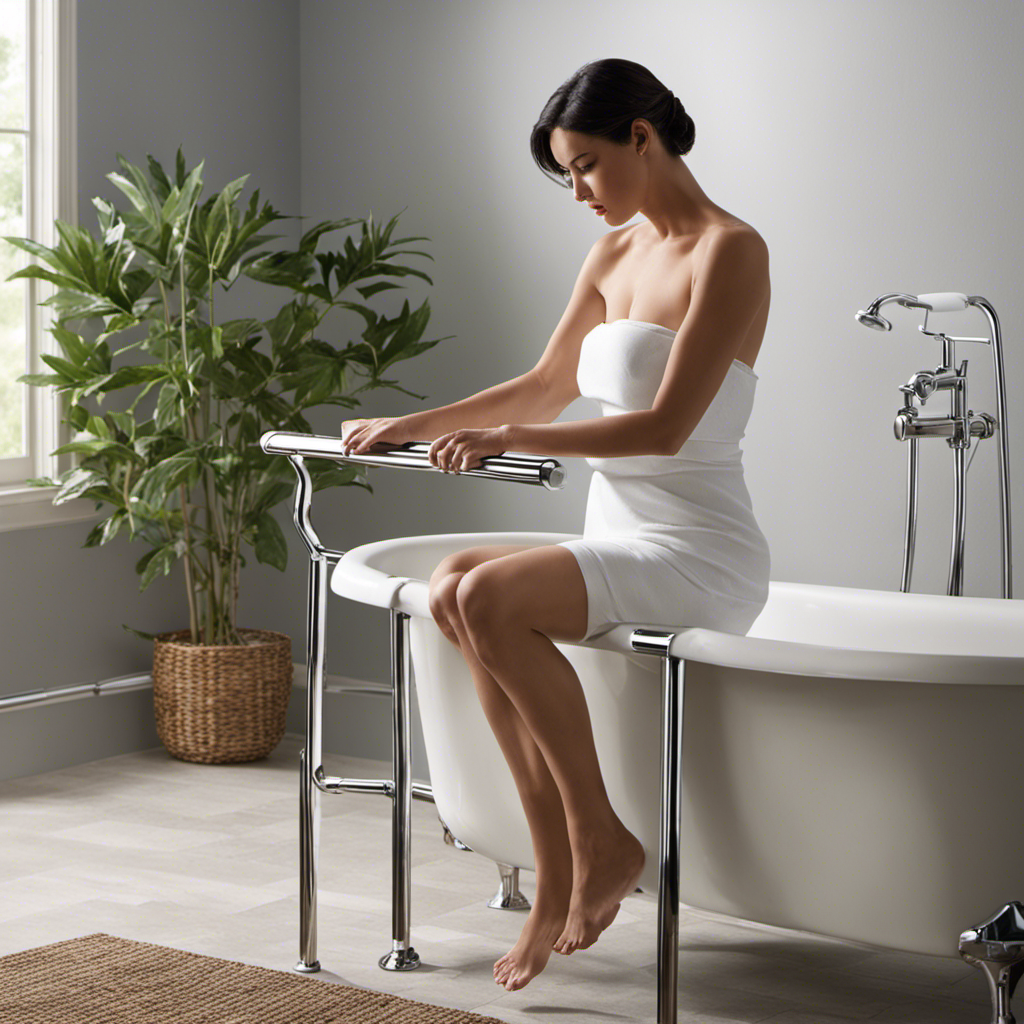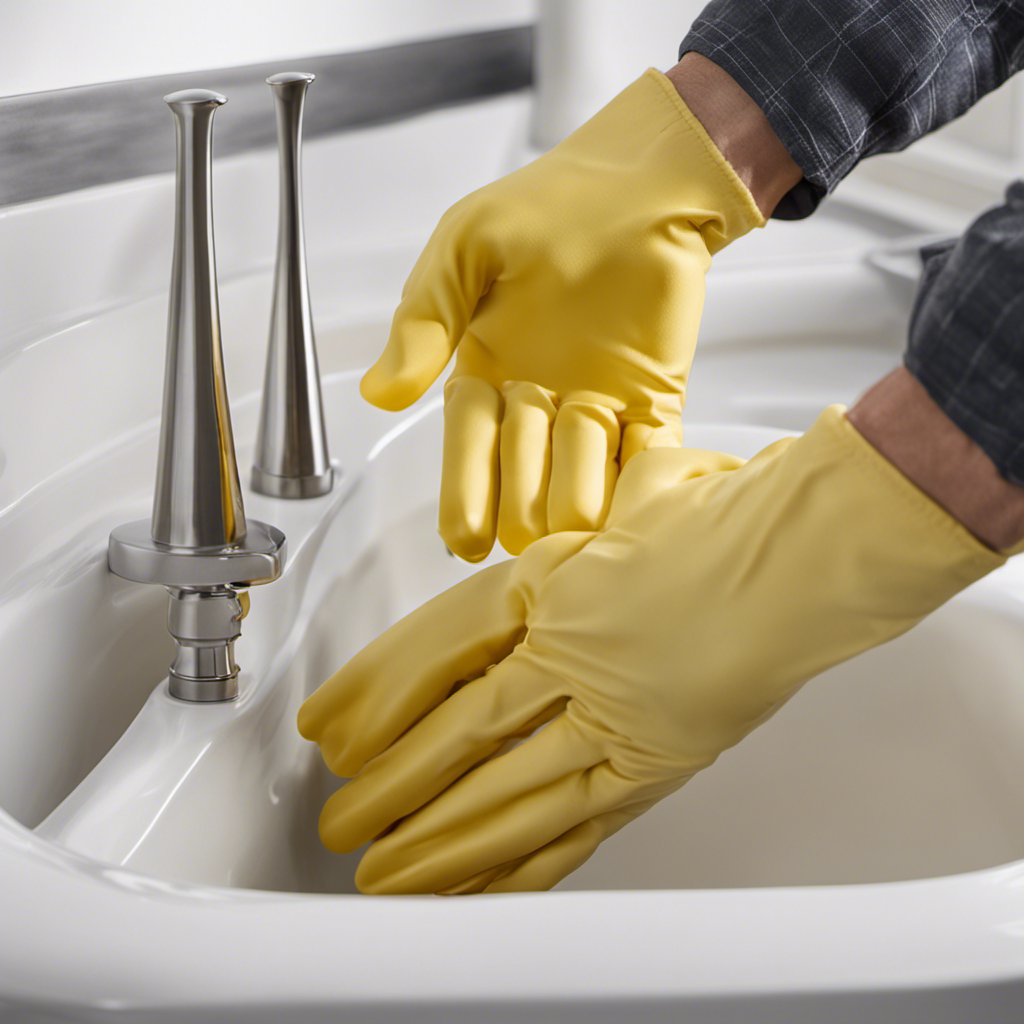I’ve learned a thing or two about how to navigate the challenge of getting in and out of a bathtub with just one leg.
It takes some preparation, a focus on safety, and the right assistive devices.
In this article, I’ll guide you step-by-step through the process, ensuring you have all the information you need to make your bathroom accessible and to navigate the bathtub with ease.
So let’s dive in and discover how to conquer this daily task with confidence.
Key Takeaways
- Install grab bars near the bathtub for stability and support
- Use a bathtub transfer bench or shower chair for safer bathing
- Place non-slip mats or adhesive strips on the floor to prevent slipping
- Prioritize safety and consult professionals if needed
Preparing the Bathroom
Before starting, make sure you have all the necessary equipment for preparing the bathroom.
Bathroom modifications are crucial in creating a supportive environment for individuals with limited mobility.
Firstly, install grab bars near the bathtub to provide stability and support when getting in and out. These bars should be securely anchored to the wall and placed at appropriate heights.
Additionally, consider using a shower chair or transfer bench to make bathing safer and more comfortable. These aids allow for seated bathing, reducing the risk of falls.
Non-slip mats or adhesive strips should also be placed on the floor to prevent slipping.
Finally, ensure that all necessary toiletries, towels, and assistive devices are within easy reach.
Ensuring Safety and Accessibility
To ensure safety and accessibility, it’s important to consider the proper equipment and techniques for entering and exiting the tub with a single leg.
Bathroom modifications and assistive technology advancements can greatly aid in this process. One important modification is installing grab bars near the tub to provide stability and support. These bars should be securely mounted to the wall and placed at strategic locations to assist with balance and leverage.
Another helpful addition is a bathtub transfer bench, which allows individuals to sit down outside the tub and then slide across into the tub. This reduces the risk of slipping or falling during the transfer.
Additionally, assistive technology advancements such as bath lifts and handrails can provide further assistance and promote independence for individuals with one leg.
Using Assistive Devices
When using assistive devices, you’ll find that they greatly improve your mobility and independence in the bathroom. Choosing the right assistive device is crucial to ensure safety and ease of use.
There are several options available, such as bathtub transfer benches, shower chairs, and grab bars. These devices can help you maintain your balance and provide support while getting in and out of the bathtub.
However, using assistive devices can come with challenges, especially if you’re not familiar with them. It’s important to familiarize yourself with the proper techniques and instructions for using each device.
Additionally, overcoming any initial discomfort or fear can be a challenge, but with practice and patience, you’ll become more confident in using these devices and enjoy the benefits they bring to your bathroom routine.
Step-By-Step Guide for Getting Into the Bathtub
Once you’re ready, start by placing your hands on the bathtub edge to support yourself.
Here is a step-by-step guide for getting into the bathtub with one leg:
-
Modify your bathtub:
- Install grab bars: These provide extra support and stability.
- Use a bathtub transfer bench: This allows you to slide into the bathtub safely.
-
Consider alternatives to traditional bathtubs:
- Walk-in bathtubs: These have a door that allows for easy access without stepping over the side.
- Roll-in showers: These have a ramp that allows for easy entry with a wheelchair or walker.
By following these steps and considering bathtub modifications or alternative options, you can safely and comfortably get in and out of the bathtub with one leg.
Remember to always prioritize your safety and consult with a professional if needed.
Step-By-Step Guide for Getting Out of the Bathtub
After you’ve finished bathing, start by slowly lifting yourself up using the bathtub edge for support. Once you’re in a sitting position, carefully swing your legs over the side of the tub. To make this process easier and safer, consider making some bathroom modifications. Installing grab bars near the tub can provide additional stability and support. Additionally, using a bath transfer bench or a shower chair can offer alternative bathing options for individuals with limited mobility. These modifications are crucial for maintaining independence and reducing the risk of falls. Here is a table that summarizes the importance of bathroom modifications and alternative bathing options:
| Bathroom Modifications | Benefits |
|---|---|
| Grab bars | Enhanced stability and support |
| Bath transfer bench | Easier and safer transition in and out of the tub |
| Shower chair | Alternative bathing option for individuals with limited mobility |
Investing in these modifications can greatly improve the bathing experience and ensure safety for individuals with one leg or limited mobility.
Conclusion
In conclusion, learning how to safely navigate in and out of the bathtub with one leg is crucial for individuals with mobility challenges. By following the step-by-step guide and utilizing assistive devices, you can regain independence and enjoy a relaxing bath without any worries.
Did you know that according to the Centers for Disease Control and Prevention, over 235,000 people visit emergency departments each year due to injuries in the bathroom? Taking the necessary precautions can significantly reduce the risk of accidents and ensure a safer bathing experience.
Stay safe and enjoy your time in the bathtub!










